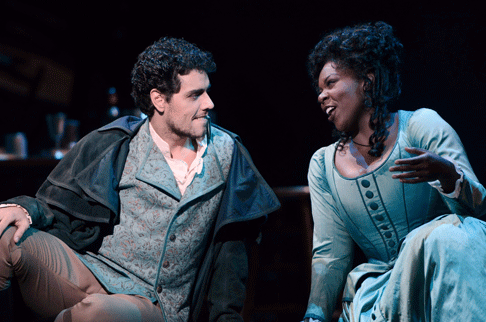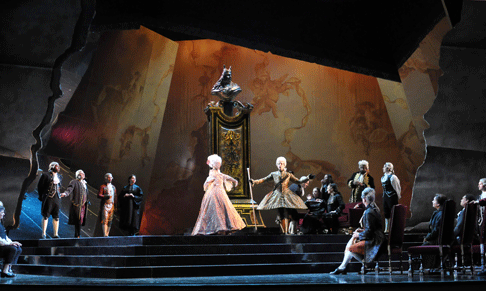The latter is a tribute to the company management, which programmed a work not
heard in Philadelphia for decades in lieu of yet another Bohème,
Tosca or Butterfly, and then overcame adversity to craft an
enjoyable evening.
Opera Philadelphia often benefits from the remarkable number of fine singers
trained in local conservatories—but rarely as much as in this production.
When the scheduled soprano (Ermonela Jaho) cancelled less than a month ago,
Texas-born Michelle Johnston, a 29-year old in her final year at AVA, stepped
in, learned the role from scratch, and sang it with distinction. A grand
finalist in last year’s Met national auditions, Johnston is a well-schooled
singer with the most of the resources to tackle the singular challenge of
Manon, whose evolution from youthful innocence through giddy greed to death in
disgrace is mirrored by a vocal transformation from lyric to
coloratura to spinto soprano. She was most impressive in
slimming down her voice for the Act II minuet scene, complete with a (quasi-)
trill. Given her youth and the rushed conditions of her premiere, it is perhaps
inevitable that, earlier and later, Johnston sometimes seemed a bit cautious.
Later in the run, she will perhaps cut loose more at the big emotional moments,
such as the aria, “Sola, Perduta, Abbandonata.” Overall, however, this was
a smart and sensitive performance by a young singer to watch.
Thiago Arancam is a 32-year old Brazilian lirico spinto tenor who
started singing late and has been trained largely in Milan. He is a sexy guy on
stage, with a voice both pleasant and intriguing, mostly due to its unusually
dark color—a quality often thought to signal grand heroic potential. For the
moment, he sings smoothly and in tune, if uniformly at forte. Yet the
sound in the middle and lower parts of the voice lacks the mixture of warm
timbre and clear ring Italian tenors prize, and sometimes fades out
suddenly—a quality that suggests the tone is being forced. Even at best, the
result, some robust high notes aside, his agreeable approach skims over
subtleties in the character of the Chevalier des Grieux: his flirtatious
serenade, sweet reflection on falling in love, and the gut-wrenching "No! No!,
Pazzo son" all sounded vaguely similar. Perhaps Arancam—scheduled to sing
this role in Dresden under Christian Thielemann in a year—will yet realize
greater potential.
 Thiago Arancam as Des Grieux and Michelle Johnson as Manon Lescaut
Thiago Arancam as Des Grieux and Michelle Johnson as Manon Lescaut
Two character baritones supported the cast well. Daniel Mobbs continued his
strong work for Philadelphia, seeming to inhabit to the character of Manon’s
rich seducer and patron Geronte de Ravoir. Troy Cook was strong if a bit uneven
as her brother. Cody Austin sang brightly as the student Edmondo, John Viscardi
pranced menacingly as the Dancing Master, and John David Miles’s robust tones
came out of nowhere as the Sergeant.
The production was vintage Philadelphia: realistic, colorful, and
cost-effective without probing even the (relatively shallow) depths of
Manon Lescaut’s libretto-by-committee. Still, it offered one
interesting idea, namely a (mechanically-challenged) drop with projected
paraphrases from of the literary text from which the story originates.
Music director Corrado Rovaris was largely in his element in this
fast-moving score, with the orchestra responding brilliantly—better than I
have ever hesrd them—in moments such as the police raid at the end of Act II.
To be sure, one might have liked to hear Rovaris encourage the young cast to
linger at other critical moments, but rubato is not his thing.
 Scene from Manon Lescaut
Scene from Manon Lescaut
Given the success of this production, perhaps Philadelphia will now dare to
extend its successful string of operas by 20th-century master Hans Werner Henze
to include his unjustly neglected adaptation of the Manon tale, Boulevard
Solitude.
Andrew Moravcsik


